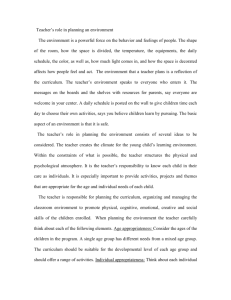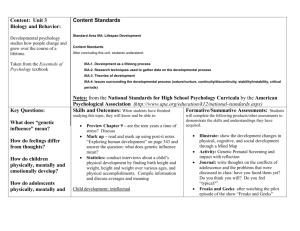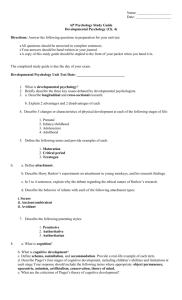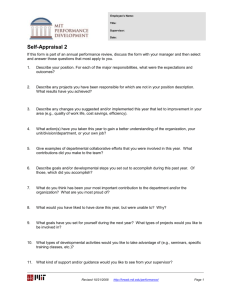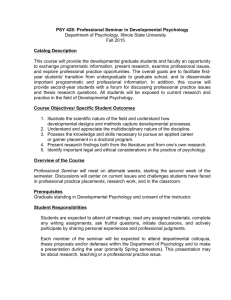Developmental Psychology
advertisement
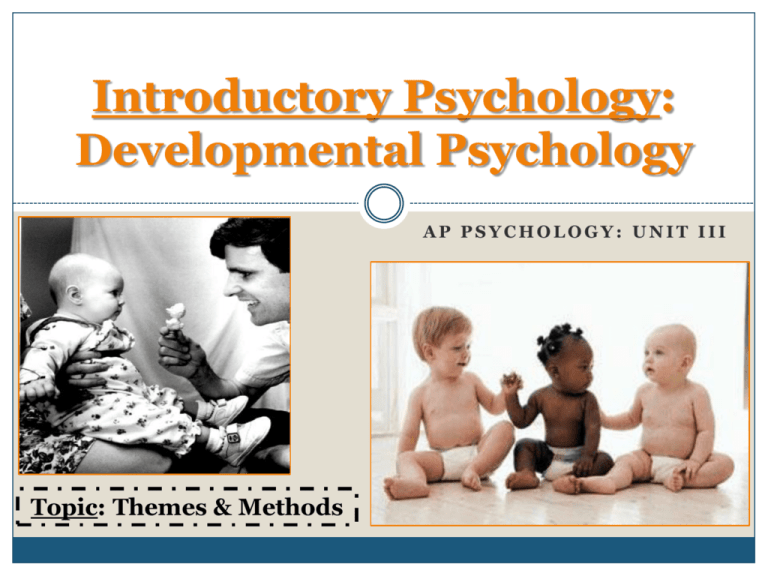
Introductory Psychology: Developmental Psychology AP PSYCHOLOGY: UNIT III Topic: Themes & Methods Developmental Psychology Developmental Psychology Developmental Psychology The scientific study of the changes that occur in people from conception to death “Womb to tomb” Developmental Psychology: Themes PART ONE Developmental: Themes Three MAJOR themes in developmental… Nature v. Nurture Continuity v. Stages How do genetic inheritance & experience influence our behavior? Is development a gradual & continuous process or a sequence of separate stages? Stability v. Change Do our early personality traits persist through life or do we become different people as we age? Developmental: Themes Theme #1: Nature v. Nurture Agree or Disagree? Differences in male and female behavior are more the result of socialization than biology… Individual genetic makeup more than experience explains why some children are strong-willed and other are compliant… Nature rather than nurture shapes whether adults tend to be optimistic or pessimistic about life… Developmental: Themes Theme #2: Continuity v. Stages Agree or Disagree? Human development is better thought of as a slow, continuous process rather than as a series of steps… Adult life consists of a series of unique challenges each defining a new stage of life… The child’s understanding of the world unfolds slowly and gradually rather than through discrete stages… Developmental: Themes Theme #3: Stability v. Change Agree or Disagree? A person who is socially outgoing as a child is also likely to be a socially outgoing adult… People of one age think and act very differently when they arrive at a later age… An adolescent with low self-esteem is also likely to feel less than worthy as an adult… Developmental Psychology: Methods PART TWO Developmental: Methods Cross-Sectional Studies Participants of various ages are compared at one point in time to determine age-related differences (SNAPSHOTS) Advantages Inexpensive Quickly completed Low attrition rate Disadvantages Different age groups are not necessarily alike Differences may be attributed to cohort differences as opposed to age differences Developmental: Methods Longitudinal Studies The same participants are studied at various ages to determine age-related changes (MOVING PICTURES) Advantages Detailed information In-depth study of developmental changes Eliminates cohort differences Disadvantages Expensive & time consuming Potential for high attrition rate Differences over time may be attributed to assessment tools, not necessarily age Developmental: Methods Cross-Sequential Studies Different participants of various ages are compared at several points in time, to determine both agerelated differences and age-related changes Combination of cross-sectional and longitudinal studies Benefits? Study Age Studied In… 1 20-year-old participants 1970 2 40-year-old participants 1990 3 60-year-old participants 2010 Group Age Studied In… 1 20-year-old participants 2010 2 40-year-old participants 2010 3 60-year-old participants 2010 Longitudinal Cross-Sectional Study Age Studied In… 1 Group ONE: 20-year-old participants Group TWO: 40-year-old participants 2010 2 Group ONE: 25-year-old participants Group TWO: 45-year-old participants 2015 Cross-Sequential Developmental: Methods Biographical/Retrospective Studies A participant’s past is reconstructed through interviews and other research about their life Advantages In-depth & detailed study of one person Disadvantages Personal recall may not be accurate Expensive and time consuming



